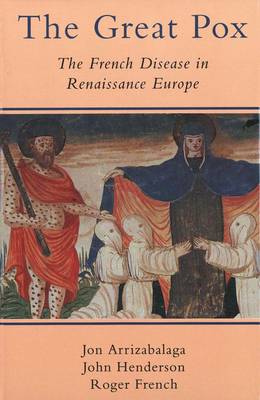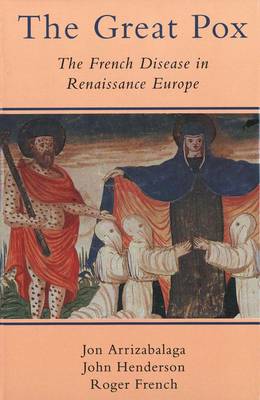
- Afhalen na 1 uur in een winkel met voorraad
- Gratis thuislevering in België vanaf € 30
- Ruim aanbod met 7 miljoen producten
- Afhalen na 1 uur in een winkel met voorraad
- Gratis thuislevering in België vanaf € 30
- Ruim aanbod met 7 miljoen producten
Zoeken
The Great Pox
The French Disease in Renaissance Europe
Jon Arrizabalaga, John Henderson, Roger French
Paperback | Engels
€ 74,95
+ 149 punten
Omschrijving
A century and a half after the Black Death killed over a third of the population of Western Europe, a new plague swept across the continent. The Great Pox - commonly known as the French Disease - brought a different kind of horror: instead of killing its victims rapidly, it endured in their bodies for years, causing acute pain, disfigurement and ultimately an agonising death. In this new study three experts explore the impact of the new plague and society's reaction to its challenge. Using a range of contemporary sources, from the archives of charitable and sanitary institutions that coped with the sick to the medical tracts of those that sought to cure it, they provide the first detailed account of the experience of the disease across Renaissance Italy, as well as in France and Germany. The authors analyse the symptoms of the Great Pox and the identity of patients, richly documented in the records of the massive hospital for 'incurables' established in early sixteenth-century Rome. They show how the disease threw accepted medical theory and practice into confusion and provoked public disputations among university teachers. And at the most practical level they reveal the plight of its victims at all levels of society, from ecclesiastical lords to the poor who begged in the streets. Examining a range of contexts from princely courts and republics to university faculties, confraternities and hospitals, the authors argue powerfully for a historical understanding of the Great Pox based on contemporary perceptions rather than on a retrospective diagnosis of what later generations came to know as 'syphilis'. Jon Arrizabalaga is Researcher in the History of Science at The Consejo Superior de Investigaciones Cientificas, Barcelona. John Henderson is Senior Research Fellow at the Wellcome Institute, Cambridge. Roger French is University Lecturer in the History of Medicine, Cambridge.
Specificaties
Betrokkenen
- Auteur(s):
- Uitgeverij:
Inhoud
- Aantal bladzijden:
- 368
- Taal:
- Engels
Eigenschappen
- Productcode (EAN):
- 9780300213171
- Verschijningsdatum:
- 2/01/1997
- Uitvoering:
- Paperback
- Formaat:
- Trade paperback (VS)
- Afmetingen:
- 156 mm x 234 mm
- Gewicht:
- 517 g

Alleen bij Standaard Boekhandel
+ 149 punten op je klantenkaart van Standaard Boekhandel
Beoordelingen
We publiceren alleen reviews die voldoen aan de voorwaarden voor reviews. Bekijk onze voorwaarden voor reviews.











